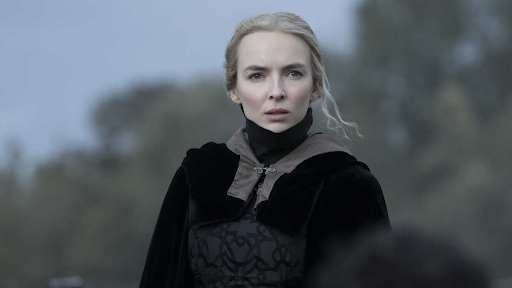*cw/tw: This review containers spoilers for the film and implicitly speaks of sexual assault.
Ridley Scott’s The Last Duel presented a promising film about sexual violence in history, but my viewing experience left me wondering if this was supposed to be a social commentary on sexual violence or if it was just a medieval epic with some social comments thrown in. If the intention of the filmmakers was the former, I definitely believe it fell flat in regards to respectfully and purposefully addressing the relevance of sexual violence throughout history and the strength of survivors who outwardly face their assailants.
The film is set in 14th-century France, where Marguerite de Carrouges accuses a squire of raping her in her home. Three slightly varying storylines expose the viewer to different interpretations of the truth—the first is from the point of view of Marguerite’s husband, the second from the accused, and the final from Marguerite herself. Although this structure prolonged the film and presented engaging counterpoints for the viewer to grapple with, I don’t think it was necessary to run through the same situation three times in order to persuade the viewer that what Marguerite experienced was real or worthy of our attention.
Each party brought in their own version of the happenings, forcing the viewer to question reality and each character’s motives. A scene from the accused squire’s point of view revealed the womanizing and disrespectful behaviors he engaged in on a regular basis. From this, it was obvious he was capable of the crime he was accused of. But then they portrayed interactions between him and Marguerite in which they were flirting with each other. Even though I knew that Marguerite was telling the truth, the very details that each character revealed made me doubt the situation. In the second chapter, she had expressed interest in him: he was charming, she was bored in her marriage and sexual life, could she have wanted it? But then the third chapter portrayed her neutral feelings towards him. It’s jarring as a survivor myself to feel drawn into the other stories of “truth,” because I have come to know that sexual violence is a real experience that no opposing argument can invalidate. In doing so, this film really made me feel uncomfortable with how they approached sexual violence from each point of view. I didn’t really need a movie to tell me that assailants may have their own convoluted idea of how a situation happened because, in my mind, the survivor’s experience is the one to listen to.
Not only were the numerous battle scenes unrelated to the assault and Marguerite’s experience, but the fact that two-thirds of the film was focused on the perspectives of men made it feel as though this film was made for a stereotypically male audience. In doing so, it seemed to provide a distant and entertaining way for men to expose themselves to sexual violence as a social issue. This portrayal of sexual assault mixed within the epic trivalizes sexual violence and its lifelong impact on survivors. The medieval heroism and violence overpowered what I thought was the main idea of this film—empowering and praising strong sexual violence survivors. In many ways, the emphasis on the male experience took away from the incredible bravery and resilience of Marguerite and the trauma she endured. After watching the film, I learned that two men wrote the first two perspectives and a woman screenwriter wrote Marguerite’s perspective. I appreciate the fact that a woman was brought in to share the perspective of another woman, but the traditional male-catering lens persisted throughout the film. Although male screenwriters have the capacity to respectfully and purposefully portray the experiences of women, the thoughtfulness did not shine through this time.
Overall, I enjoyed the film for its theatrics and its attempt at addressing an issue that continues 800 years later. However, the weight of medieval gore and violence de-emphasized the social issue at hand, and the portrayal of male characters’ perspectives truly invalidated the experience of Marguerite and survivors in general. I continue to believe our patriarchal society limits the amount of change we enact around this cause, especially if we take this approach of entertainment over empowerment.

Julia Kopala
My name is Julia, and I am currently working in Boston as a special education teacher. I joined Survivors to Superheroes because I am a survivor myself who did not have any support or resources to understand the gravity of the situation I was in. I want my writing to empower and validate the diversity of experiences and identities that survivors hold, amplifying the idea that healing is possible. Outside of the organization, I find joy in hiking, reading, and mentoring students!



